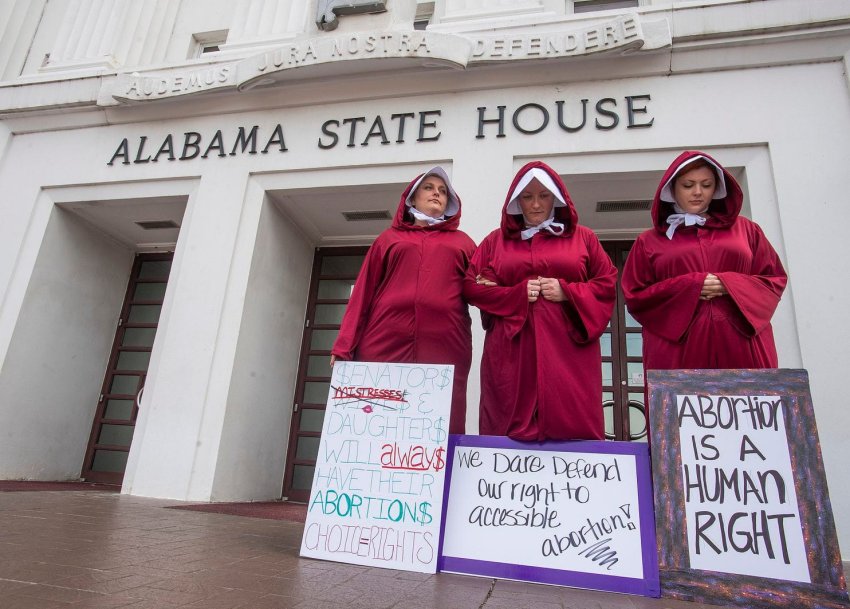
Legislative attacks on abortion rights in the US have escalated this year, as social conservatives have shifted tactics with an unprecedented wave of state abortion bans adopted.
The most restrictive legislation was signed into law by Alabama's governor on May 15. It bans abortion altogether, except for cases of medical emergency. Pregnancy resulting from sexual assault is no exception and doctors performing abortions are criminalised with penalties of up to 99 years in jail.
On May 7, Georgia became the fourth state this year (after Kentucky, Mississippi and Ohio) to sign into law an abortion ban from the time the earliest rudimentary heart tube flicker (referred to as a "heartbeat") is detected. This is typically in the sixth week of pregnancy and would outlaw about 90% of abortions.
The targets and punishments of the six-week abortion bans vary. Kentucky exempts the pregnant woman and targets the doctor, with punishment of up to five years in prison. Georgia defines the embryo or foetus as a natural person with the right to life, once heart activity is detected, and includes the woman undergoing abortion in its ban. This opens up the prospect of charging the woman with murder and subjecting them to life imprisonment or capital punishment.
North Dakota and Iowa passed similar six-week bans in 2013 and 2018 respectively. What is new this year is the number of states considering or adopting such extreme bills.
So far this year, another 10 states have introduced similar bans into their legislatures. One of these, Missouri, is just waiting for the anti-abortion governor to sign the legislation into law, after legislators passed it on May 17. The very long Missouri law bans abortion from eight weeks of pregnancy (describing it as the heartbeat standard), with back-up provisions for later gestations, if the 8-week or subsequent gestations are struck down.
The Guttmacher Institute has revealed an unprecedented 40% of the proposed 378 restrictions on abortion introduced into state legislatures this year are bans of one kind. A small number of states have protected abortion (New York) or are considering doing so (Vermont, Rhode Island and others).
Some of the abortion bans relate to gestational age, while others are designed to be triggered if the US constitutional protection for abortion is overturned — the trigger ban adopted by Tennessee resembles the new Alabama ban. Some ban abortion depending on the reason and a further group ban a particular method of performing abortion, particularly the most common method of second-trimester abortion.
By May 20, 17 such bans had become law in 10 states. Importantly, the new laws have not taken effect — either because they are due to commence some time in the future, or because of legal challenges. This means abortion remains legal in the states where the new legislation has passed, although some older restrictions may be in place in those states.
It is also worth noting that while the extreme bans form the most comprehensive attack on abortion rights, the existing restrictions already make abortion inaccessible in practice to large numbers of women of colour and poor and marginalised women, because of the cost, service closures and onerous obstacles.
The surge in legislative abortion bans (either enacted or under consideration) is significant for three reasons.
First, opponents of abortion claim to be acting in women's interests, by protecting them from the unscrupulous doctors of the "abortion industry"; or to be promoting health (to justify unnecessary clinic regulations); protecting the lives of infants born after attempted abortions; ensuring that abortions are not performed after the foetus would be viable if born; or granting some sort of conscience provision (for taxpayers, employers, insurers or healthcare providers) that trumps women's right to access abortion care. In the wave of new bans, the mask is off, and the endgame of banning all abortions, and even punishing those women and people who have them, is fully revealed.
Secondly, the extreme bans being considered or already enacted mark a shift in tactics, prepared for years and now made possible by the anti-abortion bias of the Supreme Court, following US President Donald Trump's appointment of alleged sexual assault perpetrator and anti-abortion judge Brett Cavanaugh.
The new laws are deliberately unconstitutional. Under the Roe v Wade ruling that has been upheld numerous times since 1973, abortion before the foetus is viable is protected by the US constitution on the basis of the right to privacy. It cannot be restricted after viability by states unless there are exemptions for the pregnant woman's life or health.
The strategy is intended to affect not just the state where the new legislation is enacted, but all states, through the erosion or overturning of Roe v Wade by a Supreme Court now predominantly hostile to abortion rights, as the laws are inevitably challenged in that court.
Thirdly, it marks one of the flashpoints of the war on women, trans men and nonbinary people which has accelerated under the election of "grab 'em by the pussy" Trump. Thousands of people and 50 organisations rallied around the country on May 22 to protest the tide of anti-abortion laws. Women and their allies are willing to defend abortion rights, whether by rallies, a #sexstrike (popularised by actor Alyssa Milano), cross-state solidarity or community organising.
The right is chalking up victories and the danger of a Handmaid's Tale–like dystopia is growing, but it is a danger that is sparking an intense response.